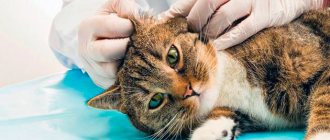Options for when a cat hisses for no reason
It happens that healthy, well-fed cats in a calm environment begin to hiss, showing aggression. This may be due to the personality traits of a particular animal. Some breeds have a predisposition to aggressive behavior.
Depending on the breed
There are several cat breeds whose representatives are distinguished by their hot-tempered nature. These are Siamese, Bengal and all hybrids with wild representatives of the cat family (forest cats, caracals, small species of lynx, etc.). They can lunge at people while playing with them.
Egyptian Mau and Abyssinian become overly aggressive if not played with enough. These breeds need space and constant exercise to release pent-up energy. Pedigree cats with thick fluffy hair react nervously to attempts to pet them after washing. Persian cats are an exception; they are quite peaceful and only hiss under extreme stress.
Sphinxes belong to a separate category. These cats can growl and hiss not out of anger or fear, but just because. Hissing is one of the ways to communicate with the outside world and is not always a sign of aggression. But you shouldn’t be deceived; anything can anger the sphinx. Hairless cats do not like cold touches.
Other factors
Other, very different circumstances also act as catalysts for growling and hissing.
Heredity
It is quite difficult to tame kittens that are born in the wild and have never met people. Such animals (especially at first) are afraid of people, hissing and growling.
Important! Do not forget that each cat has an individual character, the main features of which are determined by genes. If the kitten's father or mother had a quarrelsome and conflictual disposition, most likely he will inherit his parent's cockiness.
That is why, when going to the nursery, you need to observe (and not just for 5 minutes) how adult animals behave. Otherwise, a fighter will settle in your house, whose fighting character you will simply have to put up with.
Territory defense
The cat considers the whole house to be his own, highlighting particularly comfortable zones in it that are best not to be encroached upon. You returned after a long walk, and your pet is not happy about your arrival, turns up its nose and gets angry. The explanation is simple - he smelled a foreign odor from your clothes/shoes. For you, this is a trifle, but the cat may regard this as an enemy’s invasion of personal territory, in response to which it will begin to hiss and growl. It often comes to bites, and not only strangers suffer, but also the owners.
Provoking games
A cat growls and hisses if you flirted with it from an early age, exposing your arms and legs. This is the most dangerous reflex that should not be reinforced in an animal. With age, the habit of playing with the claws out will remain, and adult thoroughness will be added to it: the claws will become sharper, the teeth will be stronger, and bites and scratches will be much more noticeable.
This is interesting! Once the habit of dangerous gambling has taken hold, it will be very difficult to get rid of it. Psychologists advise not to succumb to provocations and show indifference when the cat attacks.
In order for your pet to cool down its warlike ardor, you can leave the room for a while. Scolding and, especially, hitting a cat is prohibited. This will lead to the opposite result - she will become embittered and even more aggressive.
Ochlophobia
Animals, like some people, are susceptible to ochlophobia (fear of crowds). Such pets cannot tolerate large gatherings and when they get into them, they begin to defend themselves, using growls/hisses as a warning.
A cat prone to ochlophobia does not like to play with children and change hands: ignore its warning signals, and it will attack. If you have a noisy company, take the cat to another room.
Pathological and psychological causes
Sometimes hissing is a manifestation of poor health, severe pain, an unstable psycho-emotional state, because the animal does not understand what is happening to it when something hurts
Therefore, if a usually calm pet suddenly begins to hiss frequently, especially when trying to touch it or pick it up, you should pay close attention to its health
If the hissing is accompanied by poor appetite, sleep disturbances, general lethargy and depression, it is necessary to take your pet for examination to a veterinarian as soon as possible.
Hissing can also act as a manifestation of irritability and dissatisfaction. In this way, the cat shows that she is now in a bad mood, she does not want to play or communicate, and wants to be left alone. It is better not to bother the animal in such a situation, since it can go from warnings to an attack, which is manifested by painful bites and scratches.
Hissing when feeling unwell
Pain and physical discomfort are often the cause of irritation in a cat.
The survival instinct dictates that a moping animal should leave everyone, hide in a den and become quiet.
We can conclude that the cat is unhealthy if the hissing is additionally accompanied by:
- refusal of food;
- lethargy and apathy;
- weight loss and tousled hair;
- mucopurulent discharge from the nose and eyes;
- urinary retention and the appearance of blood in the urine;
- drooling, vomiting and stomach upset;
- loss of coordination, unsteadiness of gait and convulsions;
- fever and heavy breathing.
Owner's actions. In cat language, a sick animal asks to be left alone. However, you cannot let the disease take its course and hope for the legendary 9 cat lives. That is why, despite hissing and resistance, the furry pet is urgently transported to a veterinary clinic, where an examination will be carried out and the necessary tests will be done to make a diagnosis and provide qualified assistance.
Hissing as an expression of fear and displeasure
Fear, as you know, is the most important incentive to action.
A person can cause fear and fear if the cat:
- Wild and uncommunicative. In this case, the animal does not allow any people to approach itself, does not understand their intentions and does not accept human affection in principle.
- Has negative communication experiences. Unpleasant, scary and painful events from the past can leave an imprint on the current state of the animal. Sometimes a cat demonstrates associative fear and, for example, may hiss at children if it has once encountered their cruelty. Cats also remember a specific offender, expressing persistent negativity towards the person who once insulted “their tailed majesty.” Such a source of unpleasant sensations often becomes a veterinarian who gives injections to a sick animal, measures rectal temperature and performs other very unpleasant actions.
- She is not socialized and has spent her entire life communicating only with a limited circle of people. If an animal is used to living in peace and quiet, communicating only with its owner and his family, then perhaps he will be frightened by a noisy company of guests or a repair team coming to the house.
Pet behavior. Usually a frightened cat tries to run away and hide, but if, after a warning hiss, they block its path to retreat, try to touch it or pick it up, the instinct of active self-defense will kick in. Sometimes a cat hisses at its owner, frightened by a sharp gesture, sound or object in its hands. Aggressive and poorly behaved pets may react with a hiss to the lack of a desired action, for example, when the owner does not give them food or a portion of affection upon request.
Division of territory
The dog becomes attached to the owner, showing boundless devotion. But cats get used to their habitat. That’s why they carefully protect their territory. At the same time, cats mark all corners of the surrounding area. And cats can hiss at an uninvited guest, even if he is several times larger than them. That’s why you can often see a cat hissing at a dog or other animal. Moreover, if this is the territory where a dog is usually located, the cat will not hiss at it, but on the contrary, it can rub against its legs, maintaining a friendly alliance with a stronger animal.
How to calm a cat
You can calm a cat that is actively aggressive towards you in the following ways so that it does not cause you harm:
- put on protective clothing and take the animal in your arms, quickly wrap it in a blanket;
- Always have a water spray with you so that in case of aggressive behavior you can spray a little water in the direction of the animal. This way you will protect yourself from possible consequences;
- Do not tease or provoke the animal if you see impending aggression or after the first attack attempt.
Also, to curb the harsh behavior of the animal, the following actions should be taken:
step away from the cat, you may need to leave the room for at least 10 minutes so that he “burns out”; if the cause of aggression is another cat or animal, then they should be isolated from each other for a while and introduced gradually; sit and do not look into the cat's eyes during the period of irritation, this will only increase its fear. You can lie down on the floor. This will make you appear shorter to the cat and this will calm her down; do not pay attention to the cat for a while so that he understands that you do not pose any threat to him; make hiding places for the cat - sometimes staying in a safe shelter for a while helps calm the animal’s negativity
If the cat is scared and has nowhere to run, the aggression will only intensify; approach the cat slowly and carefully, avoiding touching; or let him come to you himself, so that the cat can be convinced that you are open to communication and do not want to hurt him. Let him sniff you, rub his head, so the animal will quickly understand that you are not as scary as he thinks; feed the cat or give it water; do not resort to punishment, otherwise attacks of aggression will be more frequent.
Causes
There are several reasons why a cat is afraid of strangers. Perhaps she simply did not communicate with anyone else, since the owner is lonely and no one comes to visit him.
Therefore, any appearance of a stranger in the house causes a fit of fear that this “someone” may disrupt their idyll and take away the love and attention of the owner.
Also, the appearance of xenophobia may be based on the pet’s personal experience. It happens that a person, without knowing it, hurts a cat. First he strokes her, lulls her vigilance, and then suddenly grabs her by the skin and lifts her into the air. Often, strangers do this. Fearing the sharp claws of the animal, they come up with various tricks so as not to provoke an attack.
For example, a veterinarian who wants to examine your pet before giving an injection. The cat does not understand that everything is being done only for the good, it experiences a painful sensation and remembers this unpleasant moment with the stranger. Animals have a good memory, and therefore they can treat all strangers with hatred for many months, and maybe years. Every domestic cat wants to be stroked and caressed, and not to be picked up by the scruff of the neck or to have its sides crushed.
Let's look through the eyes of a furry tenant at the harsh reality. Entering the room and looking around, the cat sees many people staring at it. These are cat lovers, and therefore, they like to look at the graceful person. However, from her point of view, this means a moderate, but threat. And when strangers begin to stretch out their huge hands towards you or wave them at their faces, this is regarded as an attack.
Parenting with bites
We use the carrot and stick method when raising our children. A cat does the same thing. But nature gave her much less time for feeding and raising her offspring. Usually after 2-3 months the mother will be ready to bear kittens again, and in such a short period of time she must teach the cubs to survive in the harsh world. Therefore, the cat sometimes uses not only biting kittens, but also hits them with her paw. In this way, the mother tries to instill in the children the rules of conduct, teaches how not to behave. At such moments, she can bite the kitten without causing injury until he understands what is required of him. The cat always makes sure that all children are in her field of vision, in the nest and do not try to leave it. And when her most nimble and curious child shows disobedience, she forces him to obey. Sometimes the mother accustoms her cubs to the tray. And in this case, she also bites them and does not allow them to leave until they do the wet job.
Biting as an educational measure occurs when the cat gets tired, wants to sleep, and children climb on it like on a playground. She calms annoying and nimble children in this way. By the way, if dad lives next to his mother cat, then he can raise his offspring in the same way. This is how daddy cat demonstrates his authority and dominance.
There are always various dangers awaiting kittens on the street. Therefore, the mother is obliged to teach them to fight back the enemy. Even if the cat is domesticated and does not encounter serious predators, at the genetic level the mother is trying to teach her offspring self-defense skills. When she bites children on the neck, she shows them the most vulnerable place in a fight with an opponent - this is how she teaches them to avoid attacks from strangers.
Typically, cat self-defense lessons are played in a playful way. The mother bites the cubs lightly, pinching their skin. The skills acquired from her help the young to survive, defend themselves, their territory, and fight back against the offender.
Hunting instincts
Cats by nature are hunters. They have well developed hunting instincts. A mother can teach her cubs the wisdom of hunting when they are already grown up. She bites them, demonstrating how to capture and hold prey. Sometimes you can see how the mother cat grabs the baby with her front paws, beats him with her hind paws and bites him on the neck. So she teaches him basic hunting skills.
After such lessons, children can hone their skills on each other. And all this happens under the control of the mother. When they play too much, the cat intervenes and bites their neck, letting them know that it’s time to stop.
Cat diseases
Unfortunately, such an effect on the offspring can also be a symptom of the disease. If the cat’s birth was difficult, she is exhausted, then it is difficult for her to control her behavior. She perceives the cubs as irritants. In such cases, the bites are no longer sedative. The cat bites quite aggressively and persistently.
The most common reason for this dangerous behavior of a mother cat is postpartum eclampsia (milk fever). It is the result of a lack of calcium in the body. Its deficiency provokes inappropriate mental behavior of the mother. Sometimes even convulsions occur.
In such situations, there is no way to do without veterinary help. After all, a cat can simply die from depression of the respiratory center. For eclampsia, the doctor administers calcium gluconate intramuscularly. And kittens must be isolated from their mother during the treatment period, otherwise they are at risk of injury.
"Hises like a snake"
Hissing is a very specific sound, eloquently indicating a strong negative reaction. A surge of irritation and negative emotions confirms the entire appearance of the animal:
- open mouth with demonstration of the entire combat set of teeth;
- burning eyes with dilated pupils;
- ears pressed to the head;
- an angry bristling mustache;
- raised wool.
Associated reactions. Depending on the degree of threat and personal temperament, the severity of the defensive reaction is not always the same, so a hissing cat may:
- At the next moment, quickly retreat, fleeing.
- Take a characteristic pose with an arched back and fluffy tail raised up, which means a more serious attitude and an attempt to intimidate the enemy.
- Apply several blows with a clawed paw, while grouping yourself and pressing your stomach to the ground, which symbolizes the intention to fight. The tail twitches nervously or whips from side to side.
Who is guilty. Dissatisfaction, fear and aggression, encrypted in hissing, can be directed both at a specific living object (a rival cat, a dog, a stranger) and “into space”, being initiated by a sudden loud sound or a flashing shadow. Regardless of the source, the cat's expression of displeasure, when further provoked, can develop into an attempt at violent self-defense and end in a harsh aggressive attack.
Why does a pet suddenly become aggressive and attack its owners?
Most often, aggressive behavior is not a pathological deviation, but a consequence of the emotional state of the animal
It is necessary not only to pay attention to the immediate circumstances that led to the manifestation of hostility, but also to look for reasons in the environment, in previous events, in the cat’s past. Patient observation of your pet will help you find triggers and take measures to eliminate them.
Reaction to pain and ill health
Pain is the most common cause of sudden aggression, especially in older or restless cats. Arthritis, dental disease, injury or infection are just some of the reasons that can cause aggressive behavior. In this case, the attack occurs not only after touching, but also when the suffering pet tries to prevent possible painful contact.
Other physiological conditions also lead to aggression. Cognitive decline, loss of normal sensory perception (hearing, vision, smell) or neurological problems distort instinctive mechanisms for recognizing danger.
Sudden fear or prolonged stress
Aggression can occur in a situation where the cat feels threatened or trapped. The fight-or-flight reflex involves the sympathetic nervous system: if there is nowhere to run, the only option is to fight. Having instantly mobilized all its physical capabilities, the cat rushes to attack, and therefore such cases are especially dangerous.
Long-term stress in cats is caused by both excessive attention and neglect on the part of the owner or mistress. Not all representatives of this genus can tolerate endless affection and contact with people
“Loved” pets are in a state of stress and can react with spontaneous hostility to violation of their personal space. Parting with the owner or limiting contact with him can also provoke outbursts of rage, the purpose of which is to attract attention to oneself.
Unpleasant changes: a new smell, rearrangement of furniture, appearance of a competitor
Adaptation to new conditions is another stress factor for a cat. The aggression that arises in connection with this is called status aggression. It may arise if the owner decides to move the pet to another room, change the feeding place, or introduce new rules of the hostel. Jealousy towards other pets can also cause sudden outbursts.
Redirected aggression occurs when a cat is scared or upset, but instead of going after the true object of concern, it turns its anger towards an easy target. To relieve excitement from an external and inaccessible stimulus - unpleasant noise, smell, game, competitors, she rushes at any person nearby.
Fight for freedom, food and territory
A pronounced sense of ownership is found in both females and males. This type of behavior, unlike normal and temporary maternal aggression, can create problems. The target of an attack can be not only animals or unfamiliar visitors, but also the owners themselves. For example, it is often said that a mustachioed villain attacked one of the family members after he was forced to sit behind a closed door. There are cases when an irritated pet deliberately bites its owner, who is trying to intervene in his conflict with competitors.
Many cats, deprived of human contact at an early age, perceive their presence as a threat and use their claws and teeth to put the “enemy” to flight. While on its territory, the unsociable predator bites and scratches the alien and calms down only after it manages to drive him away.
Causes of aggression
In order not to get hurt by an aggressive cat, you need to try to distract it. Some cat breeds switch to food. A possible solution in some cases would be to ignore the cat. And when he calms down, try to solve his problem by proving that the guest, another animal or toy is not as scary as he thought.
To avoid cat fights, use water sprays or loud noises. The effect of surprise works well on animals preparing for a fight. And they completely switch their attention to an external factor. But trying to separate cats with your hands is strictly prohibited. During a fight, animals do not distinguish who is in front of them - an enemy or a beloved owner. Therefore, you can suffer from the claws of an animal.
Regardless of how pets behave, those who have had a favorite cat at least once in their life will never exchange this animal for someone else. And let cats be independent and do only what they want, but perhaps this is precisely why they attract people so much. After all, a cat is like a little tiger, with no less ambitions and willfulness. And if a cat hisses, it means he has good reasons for it.
First, you need to clarify the reason for the anger. We will proceed from the assumption that the animal is healthy. A hissing cat is scared and may run away, but it may also start biting and scratching. In the mind of an animal, danger can be the appearance of any unfamiliar and unusual object, another animal, a medical examination, or new smells. Even some unexpected actions on the part of the owner can provoke aggression.
- Fear. Cats are nervous creatures; a feeling of fear can arise in them for any reason: a change in their usual environment, unfamiliar people, unpleasant odors, painful sensations, aggressive behavior of people or other animals.
- Pain. Cats tolerate many injuries and illnesses better than people; their immune system is formed in such a way that sometimes they do not need medical intervention. However, any illness is an unpleasant sensation. At such moments, the animal only needs peace to gather strength and overcome the disease. And in response to any intervention, the cat “asks” not to disturb it. Such conditions can occur not only due to diseases: animals in heat do not always control their emotions, and females often need solitude during childbirth and pregnancy.
- Intraspecific relationships.
- The warning system exists to clarify relations between fellow tribesmen. And the hissing in this case is also translated as a warning, for example, when dividing territory. Females use this method of warning if they do not intend to mate or if they are protecting their cubs.
- Impending attack. Cats are not prone to sudden attacks unless they are hunting. Any physical aggression begins with a warning: often showdowns end at this stage if the enemy is not ready for battle.
By hissing, the animal tries to scare away the one who threatens it. After all, if you tease even the calmest cat for a long time, it will still hiss at the offender.
Sometimes a pet hisses at its owners for no apparent reason. You should not immediately blame this behavior on bad manners or aggression, because the animal may have specific reasons for this:
- 1. The cause of hissing is the smell of alcohol.
- 2. Just like among people, there are naturally aggressive individuals among animals. They even hiss at their owners when they eat their favorite treat from their hands. But this is quite a rare occurrence.
- 3. Animals are very careful around children, especially babies who cry loudly and for a long time. At the very beginning, this simply irritates them, and later they begin to hiss at the baby. Don't worry about your child. Such hissing does not mean that the cat is threatening him; this is how she relieves her nervous tension.
- 4. You can often see cats on the street looking into each other’s eyes and hissing loudly. This is how they divide the territory, warning their rivals that this is where their possessions are located.
- 5. Each cat protects its kittens to the last, despite the size of the attacking enemy.
- 6. Seeing a new animal in the house (especially a puppy or dog), the cat begins to hiss, even if it previously had an affectionate and friendly character. This is how she expresses her dissatisfaction.
- 7. Hissing is often the cause of the development of a certain disease in a pet, since many serious pathologies occur in a latent form. Animals age just like people, so if a cat, due to its age, is in pain, it hisses and snarls.
- 8. Neutered cats often get irritated and hiss for no apparent reason.
There are particularly temperamental cat breeds that are prone to aggression: Siamese, Bengal and jungle cats. You should not try to calm the animal at such moments, so as not to frighten it even more. It is necessary to give her a little time to get used to the changes and control possible hassles.
Hissing as a breed trait
It has been noted that hissing may be a consequence of the breed's temperament. Thus, emotional, easily excitable cats, characterized by a quick and vivid reaction to what is happening, are prone to outbursts of emotions. These are, for example:
- Siamese;
- egyptian Mau,
- Turkish van;
- Abyssinians;
- Cornish Rex;
- orientals.
Living in isolation and lack of regular physical activity does not benefit the character of these cats, making them even more obnoxious and grouchy.
Features of other breeds. Persian and Siberian cats are very jealous of the cleanliness of their “fur coat” and can become angry if you constantly touch them with your hands. In turn, independent British people do not like hugs and cuddles, so they can hiss when treated with familiarity. And sphinxes are prone to sound outpourings and can hiss from an excess of feelings without any negative connotation.
- why do cats hiss;
- how to stop a cat from biting;
- how to understand that a cat loves you.
Why does a cat hiss at its owner?
Most often, the aggressive behavior of cats can be explained by their intuitive reaction to external stimuli. It is not always possible to answer the question why a cat hisses at a person unequivocally, but still, an attentive owner understands the likely reason for his pet’s dissatisfaction. Humans and cats have cohabited for centuries, and the behavioral responses of these animals have been developed throughout the evolutionary process. A hissing cat shows its displeasure, trying to defend itself or scare.
To avoid conflicts with your pet, you need to understand whether he is threatening or defending himself. For a problem-free cohabitation between a person and a pet, basic communication skills are required; to develop them, an understanding of the behavior of cats is necessary. Tense posture, facial expressions, movements of the ears, tail, paws and characteristic sounds can be a signal of the animal’s dissatisfaction.
© shutterstock
Incorrect behavior of the owner in such a situation can cause the cat to show aggression; in some cases, it can rush at a person. The main probable reasons why a cat hisses are:
- fear;
- unmet needs;
- features characteristic of the breed;
- warning;
- pain;
- fight for territory.
What should you not do in the process of education?
In the process of upbringing, owners often make mistakes, reinforcing and encouraging unacceptable norms of behavior. This is due to insufficient knowledge of the psychology of cats and the principles of the formation of cause-and-effect relationships.
To wean a kitten from biting, you need to know what actions are prohibited during the raising process.
- Physical punishment. It reinforces aggressive behavior towards the owner and also contributes to the emergence of new behavioral problems.
- Unsystematic approach to education. A situation where sometimes biting is scolded and sometimes ignored will confuse the kitten. In this case, the learning process will be significantly more difficult and will take more time.
- Using physical pressure. If the kitten is afraid, do not force it to behave friendly. This will make the situation worse. Trying to forcefully overcome a kitten's fear will increase the animal's stress level.
How to deal with this?
First of all, in the fight against xenophobia, you should not encourage the cat. If you have guests and your pet runs into a “dark corner”, you should not leave her there. Gently stroking the soft fur coat and speaking kindly, you should take it out of there and take it in your arms. And then bring it closer to the guests. Just do not hold the animal forcibly for a long time, otherwise you yourself may suffer from the tenacious claws of your pet.
Ask strangers to sit down and bring the cat into the room; you can buy a special cage or carrier bag for this to make it more convenient to familiarize it with the surroundings. You shouldn’t hold out hope that she will immediately get used to everyone and come out of her secluded place for everyone to see. If guests remain quiet and have a calm conversation, the adjustment process will go faster.
There is one more trick on how to suppress an animal’s wild fear. Develop a positive reflex to a call or knock on the door. With each such signal, the owner himself should appear on the threshold of the house and thereby show the cat that there is no danger. When she gets used to extraneous noise, you can safely invite friends.
In extreme cases, you can resort to small tricks. For example, you can try not feeding your pet for several hours, and when friends come, give them a treat and invite them to talk to the cat in a calm tone and treat it with goodies.
And as a last resort, use sedatives. But this is only as prescribed by a doctor. Otherwise, you can get your xenophobe hooked on antidepressants.
If you find an error, please highlight a piece of text and press Ctrl Enter.
Examples of the most aggressive breeds
Below are the most aggressive breeds.
Siamese
Why does a kitten's whiskers break: the main reasons and what to do
Many pet lovers prefer Siamese cats because they are very beautiful in appearance. However, not everyone knows that as pets, they are not the friendliest to others. Siamese cats and cats are known for the fact that they communicate mainly with only one owner in the house, and other family members are jealous of him.
Important! They can literally completely ignore everyone else in the house. They do not like children and are not very affectionate with anyone other than their beloved owner.
Without respect for other people, representatives of the breed easily fall into an aggressive state and can even cause serious wounds.
Siamese cats are one of the aggressive breeds
Savannah
The cat breed has a direct blood connection with the Serval and the Siamese cat. The animal is characterized by energy, mobility, jumping ability, and curiosity.
The habits of a predator are clearly expressed, hence the aggressive behavior towards the owner. Like Siamese cats, Savannah chooses one single owner and treats others with contempt.
Hunting instincts passed on from the serval sometimes require careful control by the owner and education from childhood.
Savannah - a mix of serval and Siamese cat
Abyssinian
Abyssinian cats have a very energetic temperament and natural curiosity. Until old age they remain active and restless. Some compare the animal's character to that of a dog. High mobility is often accompanied by attacks of aggression, especially during the game.
Important! From childhood, the breed lacks a sense of fear and self-preservation, so education is required from an early age. The Abyssinian cat breed is restless from birth.
The Abyssinian cat breed is restless from birth.
Cat attacks are no joke, and cat bites can be more susceptible to infection than dog bites. The reason for this is that the cat's sharp teeth create deep puncture wounds in the area that are sufficient for bacterial activity. What to do when a cat attacks its owners? Although most people find this display of cat character amusing, it is not a good idea to continue this game. It is necessary to make the animal understand that its behavior is not acceptable. For this purpose, cats are sprayed with water and their attempts to continue playing are ignored.
Pet behavior
Protecting her offspring, the cat protects the little kittens until she is sure of their safety. For the same reason, pregnant cats can hiss.
If a new cat appears in the house, familiarization and division of territory takes place for some time. This can only manifest itself in a slight hiss, but it also happens in more aggressive versions. In any case, cats need time to get used to each other. When this happens, they can become good friends.
For a cat, finding the most suitable male for mating is not a simple matter, but a very responsible one. In cases where there is little choice, the only option provided may be the acceptable one. But it is not always the case. If a cat hisses at a cat in such a situation, most likely she does not see him as a future father for her offspring.
In this regard, some cats are very picky, sometimes preferring to mate with only one male for several years. At the same time, driving away all other cats with an aggressive hiss. This kind of loyalty, as well as the love for their children even when they are grown up, and the longing for other cats, indicate that cats also have human feelings, such as affection, worries and love.
If a cat often attacks people, biting their legs or arms, and then runs away, it simply lacks play activity. This happens with domestic animals that do not have the opportunity to hunt.
Hissing at other animals
Almost all cats are considered loners by nature. Even living in a house with their owners, they want to feel their independence. Therefore, the appearance of another animal in the house immediately leads to a defensive reaction - hissing, growling and other manifestations of dissatisfaction. This lasts until the “cohabitants” come to terms with each other’s existence and divide the territory among themselves.
Cats are the most angry at dogs. This is another instinct that you can’t get rid of so easily. Even if the dog is somewhere far away, the cat will hiss, scaring the animal away and not allowing it into its territory.
If a dog and a cat are forced to live in the same yard or apartment, over time the relationship between them will improve. The owners can also help them with this. To do this, they must give the same amount of attention to all pets.
Hissing when defending territory
It is known that cats have a reputation for being loners and individual owners, putting their independence above all else. The tamed animal considers the master's house to be its territory and is ready to zealously defend it from the invasion of strangers. It is noteworthy that competitors in the struggle for possessions may become:
- tribal cats;
- dogs and other pets;
- newcomers;
- owner and his family.
Zoo aggression is especially pronounced against the four-legged intruder.
This is why adult cats have great difficulty getting used to their newly arrived relatives. In this case, the hissing, demonstration of aggression and fights will continue until one of the rivals admits defeat, taking a subordinate place in the “pride” hierarchy.
Sharing territory with a person. Sometimes the dictator cat pours out its possessive instincts on humans. Thus, a tailed aggressor can hiss and swing its paw:
- when trying to take a seat next to you on the sofa or in an armchair;
- driving away from a plate of food;
- guarding toys, scratching posts and other items that he considers his own;
- sitting in a house or in a favorite place.
The smell of another cat, which the owner brought from the street or while visiting, can stimulate territorial aggression.
What does a cat want when it hisses?
The first thought of the owner who heard the cat hissing is that she is aggressive towards the cub. But the reason may lie much deeper.
Why does a cat hiss?
Wants silence The world as seen by the cat mother is full of dangers
It is important to shut up in time so that a dog running past does not notice the kittens, which can give themselves away by meowing. The cat strives to calm the kittens so that they do not attract attention. Wants to train kittens The kittens will grow up and live separately in a new home. The mother cat prepares them for future difficulties, including teaching them to stand up for themselves. The babies will be able to bite, growl and hiss like their mother
That's why you can hear this sound from kittens too. This means they have learned their lesson. She is disturbed by someone else's smell. Taking a small kitten in your arms for a few minutes means “giving” your smell. A cat may become agitated by someone else's smell, begin to hiss at its child, and even stop all contact with the baby. A weak kitten does not want to survive. Often the weakest kitten from the litter becomes the object of hissing. A rational mother cat believes that she is wasting milk on him. This is a manifestation of natural selection. It hurts her while feeding. Kittens may bite their nipples painfully while feeding. This is especially true for older babies who do not particularly need breast milk. The mother cat is angry and hisses. The animal is uncomfortable if there is no milk, but the kittens still suck. Needs peace If a cat doesn't feel well, she may hiss at the kids, asking them to leave her alone. Another pregnancy cannot be ruled out. In this case, the cat saves its energy for the future, and hissing means a signal to move away and not disturb. He believes that the kittens have grown up. Unlike people, cats do not raise their offspring for a long time - after a few months they are ready to send them “free swimming.” And the hissing in this case shows that the cat perceives grown children as competitors.
A cat hisses at its owner - what to do?
Any person who has a cat at home will agree with a simple statement - each of these cute creatures has a personal character and is similar to a person in that they also experience emotions. And what’s more, they know how to show their current mood using their body. Therefore, it should not be surprising that a cat expresses the thought that a person is trying to express in words by other means. And one of them is hissing. Yes, cute fluffy cats that live with people almost their entire lives can sometimes growl and hiss. And often very loudly, reminding people of their formidable ancestors. Why does a cat hiss, how can I make her give up this unnecessary (for humans) habit, and what behavior should the owner have when his four-legged meowing friend hisses and growls at him?
To avoid conflicts with a cat, you need to understand what is more in its hissing - threat or protection? In order for a person and a cat to live together without any problems, it is necessary to understand cat language - at least at the level of body language. Some signs (tense posture, facial expressions, wagging of the tail, movements of the paws and ears) may express the pet’s dissatisfaction with something. And if a person read all this incorrectly and also behaved incorrectly, then aggression and discontent are quite possible on the part of the animal.
The main reasons why a cat begins to hiss are:
- Fear.
- Her needs are not being met.
- Behavior is inherent to this breed.
- Warns the owner.
- Experiencing pain.
- Defends territory.
- Other reasons.
It happens that a pet is friendly with everyone around it, but hisses at someone in particular. This behavior is explained by a simple fact - the animal is afraid, remembering its first interaction with this person. Let's say he accidentally stepped on a cat's tail or did some other not very good deed. Maybe he deliberately intimidates the animal and deprives him of the opportunity to retreat, trying to pet him or grab him by the scruff of the neck. These actions are perceived by the cat as a threat and the only reaction is a hiss.
Fear once experienced is remembered by a cat for a long time. The best way to solve the problem is with goodies and kind words.
A cat can hiss intuitively. If during childhood the cat did not communicate with humans and, accordingly, was not accustomed to hands, then, as an adult, he will probably experience fear of people. Even if a cat is tamed, it can still hiss at a person who doesn’t like it in some way. With this hissing, the quadruped tries to eliminate the source of future danger. For this reason, it meets strangers, furiously raising its fur and hissing.
When strangers appear in the house, the cat should be treated to something tasty. Then the appearance of this person in the cat’s head will be associated with pleasant events. And a violent, unpleasant (for the guest) reaction can be avoided.
A cat is also easily frightened when it hears some kind of noise that is only accessible to it, because four-legged pets have extremely amazing hearing. Any sound behind the wall or under the floor is heard by the cat.
In general, a cat can imagine danger in anything, and it begins to hiss. For example:
- the owner carelessly waved his hand;
- after a visit to the veterinarian;
- strangers or animals appeared on the horizon;
- There was a loud loud sound.
And there are a lot of such situations.
If suddenly the cat for some reason begins to hiss at the owner, then there is no need to put pressure on him. You shouldn’t resist the animal’s desire to grab it in your arms and stroke it. It is better to wait until the pet calms down. In some cases, hissing just means that the animal wants its owner to calm it down. It happens that a tailed pet feels threatened for no apparent reason. Then you just need to take the cat, distract him with something - play, pour something tasty and pleasant into a bowl, and try to calm him down. If nothing helps, and the cat hisses all the time, then you should go to the veterinarian.











